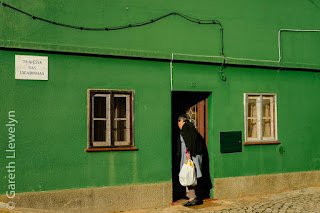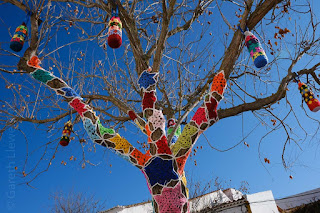In this blog I was going to tell you that we’ve ‘done’ the Algarve, from Faro, anyway, along the coast and how we really enjoyed the south west corner; unspoilt coves like Boca do Rio and the peninsular town of Sagres, praias Amado and De Bordeira, all the way to Vila Nova De Milfontes. I was going to describe our trip inland to see something of the Alantejo, Portel with its Moorish castle and Evora, a beautiful old walled town with a fabulous aqueduct, a very old university, palaces and chapels, including The Chapel of Bones (Capella dos Ossis) in the Igregia De Sao Francisco - a real curiosity!
I wanted to tell you about Bessie and how we’d had to find a vet after she’d had a series of fits and we thought we’d lost her; how the excellent attention cost just £150 - peanuts compared with what we’d have paid at home. Poor Bessie! Little does she know how grateful she should be to that lady vet.
I wanted to describe the area around Lisbon, so highly populated and where the wealth is, it seems. South of Lisbon, across the Tejo, it feels like the world is made of concrete and the sun is blocked out from the streets by huge tower blocks. The famous bridge across to the city itself, though, is spectacular and had I not been having to fiddle with Ms SatNav at the time, I might have taken in more of the view.
I wanted to paint a picture of the western corner along the shore of the Tejo; lots of affluence, fancy restaurants, more lovely Atlantic sandy beaches and Sintra, Portugal’s equivalent of Portmeirion village, but bigger, much more dramatic and less well cared for (graffiti!).
I could tell you how easy it has been to free-camp. We’ve had so many beach car-park night stops with views and sounds of the sea that I have lost count. For all that I have criticised free-camping, it’s not always easy to find places to stay otherwise, so we’ve done our best to be considerate while enjoying the freedom of ‘Home is where the Hymer is’ as we move around this lovely country (I saw that quoted on a Hymer the other day - I might crib it for ours). At this time of the year it seems that motorhomes are tolerated, even welcomed, in many places.
I could tell you a bit about Nazare where we’ve been parked up the last few days watching the huge Atlantic waves that it’s famous for, and the big wave surfers. We have a grandstand view of them and the awesomeness is hypnotic. But what I most want to write about here is the despair I felt after hearing a news item yesterday evening.
I have been doing my best to reduce our use of plastic, and we always recycle. It has been much harder while travelling and I’ve been feeling very uneasy about having to buy our drinking water in plastic containers. The news item was that in a remote arctic habitat, plastic was found in a bird’s egg. WHAT???? Looking out on this vast and beautiful ocean, I don’t see the wreckage we have poured into it, but it’s there, in vast proportions. What have we done?
On the news I have also heard about the young 15 year old girl who has been on a school-strike, protesting at the politicians’ failure to give environmental crises enough attention. I applaud her, and am mightily impressed by her bravery. She has inspired others, too, and I gather that there were similar strikes by primary and secondary children all over the UK recently. But what is the ‘adult’ response to their action? Most of the concern appears to be how schools should respond. As usual, it’s not about what the protest is about but what policies apply - should parents be prosecuted, etc; after all, these kids are missing out on their education! Ffs, how are the National Curriculum and exam pass grades going to help them in a world that is showing all the signs of serious ill health, calamity even? I am sick of hearing politicians banging on about Brexit, wasting our tax revenue on stupid arguments and petty concerns when we should be dealing with the one most important thing for the future generation. And, Trump! Stop belly-aching about that stupid wall and do something for the planet!
I can’t write any more. I’m too upset. I will attach some photos that show some beautiful bits of our world.......how they are for the moment anyway.


































